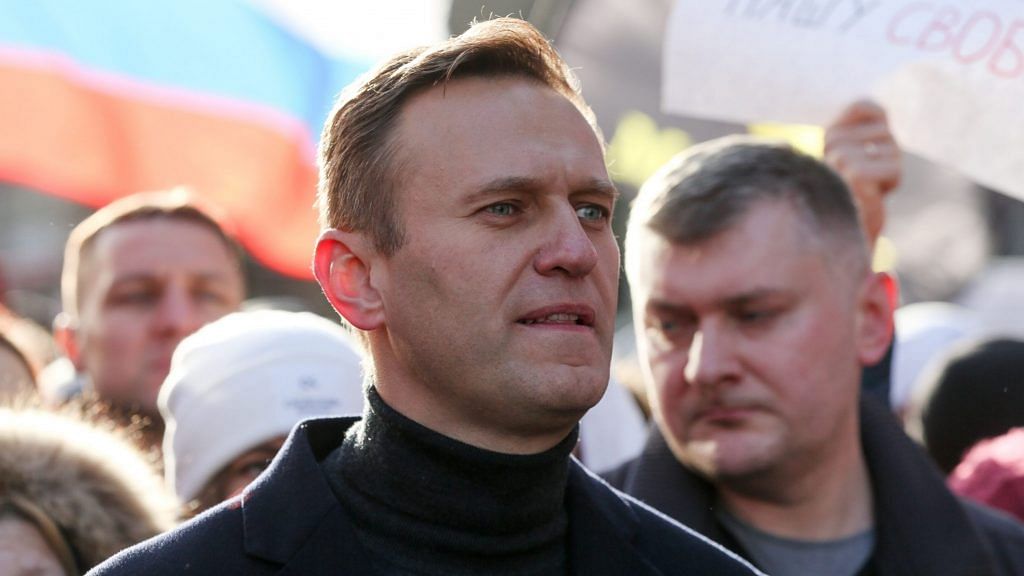Berlin: Chancellor Angela Merkel said tests showed “unequivocally” that Russian opposition leader Alexey Navalny was poisoned by a novichok nerve agent, dramatically escalating tensions with the Kremlin and sending the ruble tumbling.
Germany will consult with European Union and NATO allies to formulate an appropriate response over the incident, Merkel said, adding that the world was waiting for answers from the Russian government about what happened.
“It’s clear that Alexey Navalny is the victim of a crime. The intent was to silence him,” Merkel told reporters on Wednesday in Berlin. “It poses questions that only the Russian government can answer and must answer.”
The findings by a special German armed forces laboratory ratchet up a standoff between EU nations led by Germany and President Vladimir Putin. Merkel already raised the prospect of a coordinated response on Friday. Navalny has been receiving treatment at Berlin’s Charite hospital, where he has been in an induced coma since being flown to the German capital on Aug. 22.
U.K. Foreign Secretary Dominic Raab offered to work closely with Germany and other allies to “demonstrate that there are consequences for using banned chemical weapons anywhere in the world.” He added that “the Russian government has a clear case to answer.”
The U.S. echoed those sentiments and indicated it was ready to target the finances of those involved.
“We will work with allies and the international community to hold those in Russia accountable, wherever the evidence leads, and restrict funds for their malign activities,” said John Ullyot, spokesman for the National Security Council.
A novichok agent was used in the March 2018 attempted murder of former Russian spy Sergei Skripal and his daughter on British soil. The U.K.’s allies joined in a concerted expulsion of 150 Russian diplomats in retaliation, which led to a sharp escalation of tensions.
The presence of the nerve agent links the Kremlin directly to the poisoning, Lithuanian Foreign Minister Linas Linkevicius said on Twitter.
“Russian authorities stand behind this,” he said on Twitter, a sentiment that was also echoed by lawmakers in Merkel’s bloc in parliament. “Those responsible for such a cynical crime must face consequences. Not too many lines remain uncrossed,” Linkevicius said.
Kremlin spokesman Dmitry Peskov said Moscow is ready to cooperate with the German government on the case but reiterated that Russian doctors found no evidence Navalny was poisoned.
Russia’s Foreign Ministry took a harder line, blasting the German conclusion as presented “without any facts.” The ministry suggested Berlin was trying to “justify some pre-planned retaliatory measures” against Russia.
The ruble extended losses on the day, trading down as much as 1.9% against the dollar as investors worried the latest German statement could lead to more sanctions.
Germany’s findings on the use of the banned nerve agent in Navalny’s poisoning are likely to severely escalate tensions between Russia and the West, said Andrey Kortunov, director of the Kremlin-founded Russian International Affairs Council. At a time when Russia has said it may send security forces to suppress election protests in neighboring Belarus, the risk is of a downward spiral in ties.
“There’s no limit to how bad things can get,” Kortunov said by phone. “This could lead to a new ratcheting up of sanctions.”
Serious condition
Merkel gathered with top ministers on Wednesday after learning of the toxicological results. The government will involve the Organisation for the Prohibition of Chemical Weapons.
Charite hospital said on Wednesday that Navalny’s condition remained serious and that he continued to be on an artificial respirator, even if his symptoms are receding. A vocal Putin critic, Navalny became violently ill on a flight from the Siberian city of Tomsk last month.
Merkel has become exasperated with Putin, whom she views as showing no flexibility as a list of grievances with the Kremlin continues to mount. The Navalny affair is now another point of contention, in addition to a murder in broad daylight in a Berlin park last summer and a 2015 cyberattack on the Bundestag, Germany’s lower house of parliament.
The scope of the response remains unclear. On Friday, she said she wanted the Nord Stream 2 gas pipeline to Russia to be completed and rejected any suggestion that it should be used as a bargaining chip to put pressure on Russia. The project is a joint Russian-European economic venture and linking it to the Navalny case “isn’t appropriate,” she said. – Bloomberg
Also read: Putin critic Alexei Navalny is latest Russian dissident to be poisoned & why Belarus on fire
